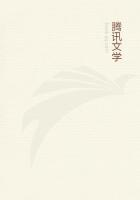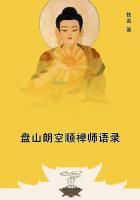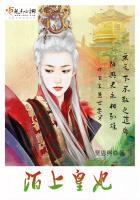At the hazard of wearying you this tale of vehe- ment emotions must be prefaced by a discourse on geometry.
Nature moves in circles; Art in straight lines.
The natural is rounded; the artificial is made up of angles. A man lost in the snow wanders, in spite of himself, in perfect circles; the city man's feet, denaturalized by rectangular streets and floors, carry him ever away from himself.
The round eyes of childhood typify innocence; the narrowed line of the flirt's optic proves the in- vasion of art. The horizontal mouth is the mark of determined cunning; who has not read Nature's most spontaneous lyric in lips rounded for the candid kiss?
Beauty is Nature in perfection; circularity is its chief attribute. Behold the full moon, the enchant- ing golf ball, the domes of splendid temples, the huckleberry pie, the wedding ring, the circus ring, the ring for the waiter, and the "round" of drinks.
On the other hand, straight lines show that Na- ture has been deflected. Imagine Venus's girdle transformed into a "straight front"!
When we begin to move in straight lines and turn sharp corners our natures begin to change. The consequence is that Nature, being more adaptive than Art, tries to conform to its sterner regulations. The result is often a rather curious product -- for in- stance: A prize chrysanthemum, wood alcohol whis- key, a Republican Missouri, cauliflower au gratin, and a New Yorker, Nature is lost quickest in a big city. The cause is geometrical, not moral. The straight lines of its streets and architecture, the rectangularity of its laws and social customs, the undeviating pavements, the hard, severe, depressing, uncompromising rules of all its ways -- even of its recreation and sports -- coldly exhibit a sneering defiance of the curved line of Nature.
Wherefore, it may be said that the big city has demonstrated the problem of squaring the circle.
And it may be added that this mathematical intro- duction precedes an account of the fate of a Kentucky feud that was imported to the city that has a habit of ****** its importations conform to its angles.
The feud began in the Cumberland Mountains be- tween the Folwell and the Harkness families. The first victim of the homespun vendetta was a 'possum dog belonging to Bill Harkness. The Harkness family evened up this dire loss by laying out the chief of the Folwell clan. The Folwells were prompt at repartee. They oiled up their squirrel rifles and made it feasible for Bill Harkness to follow his dog to a land where the 'possums come down when treed without the stroke of an ax.
The feud flourished for forty years. Harknesses were shot at the plough, through their lamp-lit cabin windows, coming from camp-meeting, asleep, in duello, sober and otherwise, singly and in family groups, prepared and unprepared. Folwells had the branches of their family tree lopped off in similar ways, as the traditions of their country prescribed and authorized.
By and by the pruning left but a single member of each family. And then Cal Harkness, probably reasoning that further pursuance of the controversy would give a too decided personal flavor to the feud, suddenly disappeared from the relieved Cumberlands, baulking the avenging hand of Sam, the ultimate op- posing Folwell.
A year afterward Sam Folwell learned that his hereditary, unsuppressed enemy was living in New York City. Sam turned over the big iron wash-pot in the yard, scraped off some of the soot, which he mixed with lard and shined his boots with the com- pound. He put on his store clothes of butternut dyed black, a white shirt and collar, and packed a carpet-sack with Spartan lingerie. He took his squirrel rifle from its hooks, but put it back again with a sigh. However ethical and plausible the habit might be in the Cumberlands, perhaps New York would not swallow his pose of hunting squirrels among the skyscrapers along Broadway. An ancient but reliable Colt's revolver that he resurrected from a bureau drawer seemed to proclaim itself the pink of weapons for metropolitan adventure and vengeance.
This and a hunting-knife in a leather sheath, Sam packed in the carpet-sack. As he started, Muleback, for the lowland railroad station the last Folwell turned in his saddle and looked grimly at the little cluster of white-pine slabs in the clump of cedars that marked the Folwell burying-ground.
Sam Folwell arrived in New York in the night.















